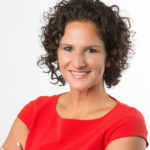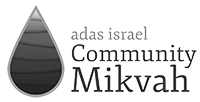An Ancient Ritual for Our Times
by Maiya Edelson
When my now husband and I started planning our wedding, we sat down together and talked about the values and priorities we wanted throughout the planning process and the event itself. We spoke about the “feel” of our ceremony and reception, and how we wanted it to be fun and festive and feel like an extension of hosting a gathering of friends and family in our own home.
Even when the COVID-19 pandemic forced us to adjust our wedding expectations and have a smaller in-person group with a much larger virtual audience, we still kept our priorities and values the same. They helped guide us as we had to make some tough decisions on how to proceed. As we learned together with our rabbi about the various elements and customs of the chuppah ceremony, dug into language of the ketubah and how it connected with our vision for our partnership, and discussed how we wanted to involve those close to us in the ceremony, we remained committed to the notion that our nuptials should feel as authentic to who we were as a couple as possible while embracing the traditions that were the thread tying us to the generations of our family that came before us.
We were getting married in Austin, TX, and our officiant was a local rabbi who had been a close friend of mine for over a decade and who had been able to get to know my husband during our relationship. As our wedding week drew nearer, I considered how a mikveh experience would be a part of the preparations. I had it on the checklist next to “adjust florist order” and “finalize socially distanced seating chart,” but a couple months out still had not thought deeply about how it would go. Did I want someone to join me? What were the options available in my community? Why did I have this on my checklist? What was I looking for out of the experience? Was it a ritual obligation, a spiritual practice, both, or neither?
In consulting with my rabbi, she mentioned that Barton Springs Pool, an Austin landmark whose water comes entirely from natural springs, could double as a kosher mikveh. Barton Springs is a summertime favorite for Austinites of all ages, and one of its remarkable features is that the water stays the same temperature year around. While on a weekend afternoon the pool is quite crowded, early in the morning it is open and available for use, presenting a calm and quiet opportunity for a sunrise swim or, in my case, to fulfill the mitzvah of immersing in a mikveh.
When we picked our wedding venue, a boutique hotel on iconic South Congress Avenue, we loved how uniquely Austin it was. It was a place that one wouldn’t find in any other city. We wanted our wedding to have character and reflect the unique qualities of our relationship and also of the location where we were formalizing our commitment to each other. I laughed about how “classically Austin” it was to use Barton Springs in this special way. So the week of our wedding, I put on loose-fitting clothing and drove down to Barton Springs while it was still dark out.
Using Mayyim Hayyim’s immersion ceremony and kavanot (intentions) for a bride, I found a quiet corner of the pool away from the handful of swimmers who braved the early morning temperatures to get their laps in. I made my way to the edge of the pool, just as a sliver of orange sun was starting to creep over the downtown Austin skyline, and immersed completely into the cool water three times. The days leading into a wedding, pandemic or no pandemic, can be stressful: final details, monitoring weather, managing friends and family. With my immersion, however, I felt a focus on what the week was truly about: beginning a new phase of life and marking a transition to creating a new household and family unit. Being able to craft this quiet, deeply personal mikveh moment with the assistance of Mayyim Hayyim’s resources and the guidance of my rabbi was a special memory, with few frills or pomp and circumstance, but with deep meaning and authentic connection to this ancient ritual for our times.
 Maiya Edelson is the Executive Director of Texas Hillel, working closely with students, staff, and the broader community to advance Hillel’s work on campus and to inspire every Jewish student to create an enduring commitment to Jewish life, learning, and Israel. She is also pursuing a doctorate in education, with a focus on organizational change and leadership, from the Rossier School of Education at USC. Maiya is married to Dr. Jerome Edelson, a physician at Brooke Army Medical Center, and they reside in Austin and San Antonio.
Maiya Edelson is the Executive Director of Texas Hillel, working closely with students, staff, and the broader community to advance Hillel’s work on campus and to inspire every Jewish student to create an enduring commitment to Jewish life, learning, and Israel. She is also pursuing a doctorate in education, with a focus on organizational change and leadership, from the Rossier School of Education at USC. Maiya is married to Dr. Jerome Edelson, a physician at Brooke Army Medical Center, and they reside in Austin and San Antonio.



